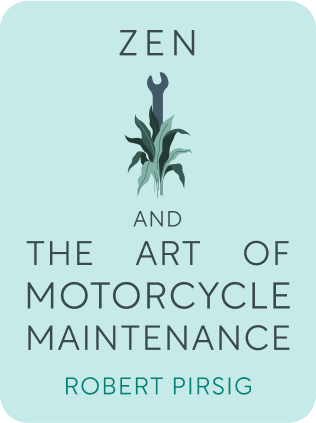

This article is an excerpt from the Shortform book guide to "Zen And The Art Of Motorcycle Maintenance" by Robert Pirsig. Shortform has the world's best summaries and analyses of books you should be reading.
Like this article? Sign up for a free trial here .
Are you looking for Zen and the Art of Motorcycle Maintenance quotes? How can these quotes help you understand the major lessons and philosophies in the book?
These six Zen and the Art of Motorcycle Maintenance quotes cover ideas from the book like quality, art and technology, pursuing your path, and more. The book offers many philosophical ideas, and studying Zen and the Art of Motorcycle Maintenance quotes can help you get inspired to live by these ideas.
Keep reading for the best Zen and the Art of Motorcycle Maintenance quotes.
Zen and the Art of Motorcycle Maintenance Quotes: Life, The Future, and More
These Zen and the Art of Motorcycle Maintenance quotes talk about how to best live your life and seek the truth. Read them to find out moer about the book and its philosophies.
“The truth knocks on the door and you say, “Go away, I’m looking for the truth,” and so it goes away. Puzzling.”
As Phaedrus thought further about the history of science, he realized that the more people “did science,” the more quickly scientific truths were proven untrue—that is, the more widespread the scientific method became, the less stable were the truths it uncovered. And the reason these “truths” were proven untrue was the proliferation of hypotheses caused by the scientific method. He concluded that, rather than moving us toward final, everlasting truths, the scientific method was actually moving us away from them.
Although this discovery is firmly rooted in classical thinking, its general features are also recognized by romantics like John and Sylvia Sutherland. The rapid changes scientific advance causes in our lives—through new technology, medicines, and products—can seem chaotic and bewildering. That’s because, according to Phaedrus, they are chaotic. They must be, because the scientific method doesn’t produce static truth but provisional and relative truths.
“You are never dedicated to something you have complete confidence in. No one is fanatically shouting that the sun is going to rise tomorrow. They know it’s going to rise tomorrow. When people are fanatically dedicated to political or religious faiths or any other kinds of dogmas or goals, it’s always because these dogmas or goals are in doubt.”
In his lecture, Phaedrus likened the university’s physical structures to a church building and its faculty to ministers. A church building isn’t sacred for its own sake—it’s made holy by its parishioners and their faith. And a minister’s primary goal isn’t to serve his community but to serve God (and thereby, in the long run, to do right by his congregation). Hence Phaedrus’s alternative name for the real university: the “Church of Reason.”
But why, when Phaedrus had already lost his own faith in rational thought’s ability to find truth, did he defend its free exercise so zealously?
Pirsig believes Phaedrus’s crisis of confidence drove him to defend the Church of Reason. We’re never fanatical about something we’re sure of—no one devotes themselves to convincing others that water will run downhill. Rather, we give ourselves to causes when they’re in doubt.
“You look at where you’re going and where you are and it never makes sense, but then you look back at where you’ve been and a pattern seems to emerge.”
Phaedrus saw his inquiry into Quality as an attempt to find a new path up the mountain of existential meaning. His ascent can be divided into two phases: a creative, unsystematic phase, which Phaedrus found enjoyable; and a rigorous, hierarchical phase, which Phaedrus thought resulted in a new conception of human existence but came at the cost of his family and freedom.
Pirsig believes that a new theory of the meaning of existence—a new path up the mountain—is needed now more than ever. Many modern people still follow the precepts of Jesus and Moses, but if those figures were to appear today and start spreading their message, they wouldn’t be taken seriously. This isn’t because their ideas aren’t wise or true, but rather because the historical context has changed—a reference to “Heaven above,” in an age when we can see into distant space, prompts questions about where exactly Heaven is located.
“We’re in such a hurry most of the time we never get much chance to talk. The result is a kind of endless day-to-day shallowness, a monotony that leaves a person wondering years later where all the time went and sorry that it’s all gone. ”
The hikers are in deep wilderness. Pirsig notes that the route he’s chosen will take them near a road on the second day in case anything goes wrong. Soon, the trail they’re following just about disappears.
The hikers are in deep wilderness. Pirsig notes that the route he’s chosen will take them near a road on the second day in case anything goes wrong. Soon, the trail they’re following just about disappears.
The hikers are stopped. Chris, exhausted and surly, is resting under a tree. Pirsig intuits that Chris is afraid he doesn’t have the strength or willpower to make it up the mountain. To distract him, Pirsig tells a story about encountering a bull moose while on a hike with Chris’s mother. It cheers Chris up enough to make him communicative. Pirsig urges him to take it slower from here on out because the slope is getting steeper. To climb a mountain, Pirsig tells us, one must live in the present and take it one step at a time.
“Sometimes it’s a little better to travel than to arrive”
Although the final destination is Montana, Pirsig tells us that he and his compatriots are traveling more or less for travel’s sake. Thus, rather than ride on freeways, they try whenever possible to stay on local roads. Pirsig calls this making good time—that is, relishing the experience of traveling no matter how long the journey takes (as opposed to making good time—that is, reaching your destination as quickly as possible). The difference in emphasis—on the quality of the time spent rather than its quantity—is what Pirsig wants to highlight.
This is one of the most famous Zen and the Art of Motorcycle Maintenance quotes.
“Is it hard?’
Not if you have the right attitudes. It’s having the right attitudes thats hard.”
In the process of attending to our task with a calm mind, there’s always the possibility that unforeseen problems may arise. Pirsig calls these annoyances “gumption traps,” for they siphon off the initial enthusiasm—the gumption—we feel as we become attuned to Quality and immersed in our work.
Although there are likely an infinite number of gumption traps, Pirsig narrows the field to two main types: Setbacks, which are external circumstances that divert us from the Quality path; and Hang-Ups, which are internal circumstances that do.
An all-too-common setback is the “leftover part” setback. Say, for example, you’re assembling an engine and nearly have it completed…when you discover not only that you’ve forgotten an essential part but also that you have to reassemble the whole thing! A setback like this can absolutely drain your gumption reservoir.
Consider these Zen and the Art of Motorcycle Maintenance quotes when coming up with your own life philosophy, or even if you go on a motorcycle road trip.

———End of Preview———
Like what you just read? Read the rest of the world's best book summary and analysis of Robert Pirsig's "Zen And The Art Of Motorcycle Maintenance" at Shortform .
Here's what you'll find in our full Zen And The Art Of Motorcycle Maintenance summary :
- How an unnamed narrator and his son are on a cross-country motorcycle journey
- Why technology can be creative
- How to focus on what's in front of you in order to get exactly what you need






